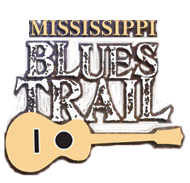Birthplace of the Blues?
Birthplace of the Blues? - Dockery
The precise origins of the blues are lost to time, but one of the primal centers for the music in Mississippi was Dockery Farms. For nearly three decades the plantation was intermittently the home of Charley Patton (c. 1891–1934), the most important early Delta blues musician. Patton himself learned from fellow Dockery resident Henry Sloan and influenced many other musicians who came here, including Howlin’ Wolf, Willie Brown, Tommy Johnson, and Roebuck “Pops” Staples.
Dockery Farms, one of the most important plantations in the Delta, was founded in 1895 by William Alfred “Will” Dockery (1865-1936). Dockery purchased thousands of acres bordering the Sunflower River and worked for years to clear the swampy woodlands. At its peak Dockery Farms was essentially a self-sufficient town with an elementary school, churches, post and telegraph offices, its own currency, resident doctor, railroad depot, ferry, blacksmith shop, cotton gin, cemeteries, picnic grounds for the workers, and a commissary that sold dry goods, furniture, and groceries. In the early 20th century Dockery housed four hundred tenant families, most of whom were African Americans who migrated to the region in pursuit of work. Will Dockery earned a reputation for treating his tenants fairly, and many resided there for long periods of time.
One such family was that of Bill Patton, Jr. and his wife Annie, who moved here with their five children from the Bolton/Edwards area east of Vicksburg in the early 1900s. The Pattons were relatively prosperous and well educated—Bill Patton later bought his own land and operated a country store in nearby Renova—and their son Charley (born between 1885 and 1891, according to various records) decided to pursue a life in music. He was inspired by an older guitarist, Henry Sloan, who like the Patton family had moved to Dockery from the Bolton area. By around 1910, Patton was himself influencing other musicians, including his longtime partner Willie Brown; Tommy Johnson, who became the most influential musician in the Jackson area; Howlin’ Wolf, who took guitar lessons from Patton after moving to the area as a teen and later recorded a version of Patton’s “Pony Blues”; and Roebuck “Pops” Staples, who later led the popular gospel group the Staple Singers. Historians have traced so much blues back to Patton and his contemporaries around Dockery and Drew that the area is regarded by some as the wellspring of Delta blues.
Patton was a popular performer in the region among both whites and Blacks, and at Dockery he often played on the porch of the commissary and at all-night picnics hosted by Will Dockery for residents. He began recording in 1929, and many of the songs he recorded addressed daily life and events in the Delta, including some at Dockery. In “34 Blues” Patton sang of being banished from Dockery by plantation manager Herman Jett, apparently because Patton was running off with various tenants’ women. Patton’s “Pea Vine Blues” referred to a train line that ran from Dockery westward to Boyle, where it connected with the “Yellow Dog” line that led to Cleveland and points beyond. Some of Patton’s relatives continued to live and work at Dockery, and though he roamed the Delta and beyond playing the blues and sometimes preaching, Dockery was his most regular stopping point. Patton died of mitral valve disorder on April 28, 1934, near Indianola.
content © Mississippi Blues Commission
[ BACK TO TOP ]

